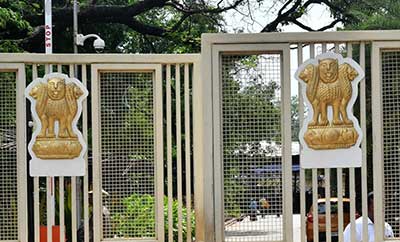Date: 27/12/2022
Relevance: GS-2: State Legislatures—Structure, Functioning, Conduct of Business, Powers & Privileges, and Issues Arising out of these.
Key Phrases: Article 200, Prushothaman Nambudiri vs State of Kerala (1962), Justice B.P. Jeevan Reddy-led Committee, National Commission to Review the Working of the Constitution, Sarkaria Commission,
Why in News?
- When the Constitution was adopted by the Constituent Assembly, the founders left deliberate gaps in it to enable a future Parliament to modify and amend the Constitution that was in accordance with the aspirations and the will of the people. This ostensibly gave birth to a constitution with glaring misses.
Some of the Gaps under the constitution:
- No timeline for Governor’s assent:
- Article 200 does not prescribe a timeline for the Governor to provide assent to Bills sent by the Legislative Assembly.
- Governors of various opposition-ruled states have used this to their advantage in order to obscure the mandate of democratically elected governments.
- Recent examples of withholding assent:
- Tamil Nadu Prohibition of Online Gambling and Regulation of Online Games Bill, 2022.
- Kerala Lok Ayukta (Amendment) Bill, 2022.
- Issue of assent over bills reserved for the President:
- The additional issue of the President not acting swiftly to grant assent to the Bills reserved by the Governor for the consideration of the President cannot be missed.
- The President has not yet acted on the National Eligibility cum Entrance Test (NEET)-exemption Bill passed by the Tamil Nadu Assembly after it was referred to the President in May 2022.
- There is no timeline prescribed for even the President, under Article 201 of the Constitution, to decide on the outcome of the Bill.
- Even though there is no timeline for the President to grant assent, there is a timeline of six months applicable to the State Assembly to reconsider the Bill if the President decides to refer it back to the House.
Constitutional scheme:
- Constituent assembly debate:
- When the draft of Article 200 was discussed in the Constituent Assembly, it was highlighted how there is no time limit prescribed for the Governor to act.
- Prushothaman Nambudiri vs State of Kerala (1962):
- A Constitution Bench of the Supreme Court clarified that the Constitution does not impose any time limit within which the Governor should provide assent to Bills.
- The Governor must honour the will of the Legislature and the President or a Governor can act only in harmony with their Council of Ministers.
- When a Governor withholds assent to a law validly passed by the Legislature, he is undoing the will of the Legislature through unconstitutional devices, thereby directly attacking the federal edifice of the Constitution.
- Causing delay to assent Bills will be an arbitrary exercise, which in itself is constitutionally abhorrent.
Call for reforms:
- Justice B.P. Jeevan Reddy-led Committee:
- In a consultation paper, the ‘Institution of Governor under the Constitution’, the committee states that if the Governor withholds assent to a Bill indefinitely, “such a course will not be conducive with the decorous regard a Governor is expected to the rules of the Constitutional game”.
- National Commission to Review the Working of the Constitution:
- There should be a time limit — say a period of six months — within which the Governor should decide whether to grant assent or to reserve a Bill for consideration by the President.
- State governments’ opinion before the Sarkaria Commission:
- Governor will act as a safety valve against hasty legislation and by their operation enable the State Government and Legislature to have a second look at it.
- Sarkaria Commission:
- Delay from the side of the Governor in granting assent can be avoided by streamlining the existing procedures; by making prior consultation with the Governor at the stage of the drafting of the Bill itself, and by prescribing time limits for its disposal.
Delay hinders reasonableness:
- In the realm of administrative law, unreasonable delay in granting administrative sanction would be violative of the rule of law.
- Therefore, it implies that the Governor will have to grant assent or decline the same within a ‘reasonable time’.
- ‘Reasonable time’ is what is necessary, under the circumstances, to do conveniently what the contract or duty requires should be done in a particular case.
- In Keisham Meghachandra Singh vs The Hon’ble Speaker, Manipur Legislative Assembly (2020), a case on anti-defection law, the Supreme Court held that the Speaker must act on disqualification petitions against the defecting MLAs within a ‘reasonable time’.
- It clarified in the same judgment that reasonable time is three months in the case of disqualification petitions.
Conclusion:
- The concept that the Queen reigns, but the Minister’s rule is the bedrock of the Westminster system.
- The Governor’s duty is only to ensure that an elected government is working within the parameters of the Constitution.
- It does not mean that the Governor can sit on the Bills indefinitely, merely because there is no time limit prescribed for the Governor to decide on the bills.
- The Constitution should be read contextually to provide a meaning that the Governor must act on the Bills within a reasonable time, say three months.
- The constitutional silences should not give way for unconstitutional inaction, leaving space for anarchy in the rule of law.
- As Justice V.R. Krishna Iyer put it pithily in Shamsher Singh and Anr. vs State Of Punjab, “maybe, our founding fathers were not political prophets who could foresee glaring abuses or perverted developments”.
Source: The Hindu
Mains Question:
Q. What are the issues with constitutional silence over the timeline for the Governor to provide assent to bills sent by the Legislative Assembly under Article 200? In the context of the issue, suggest some reforms.






















